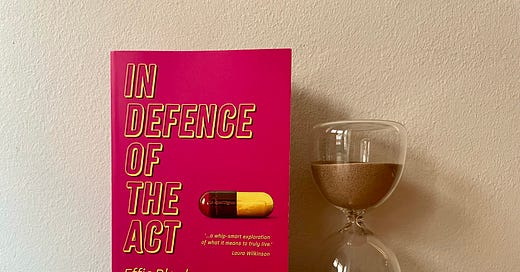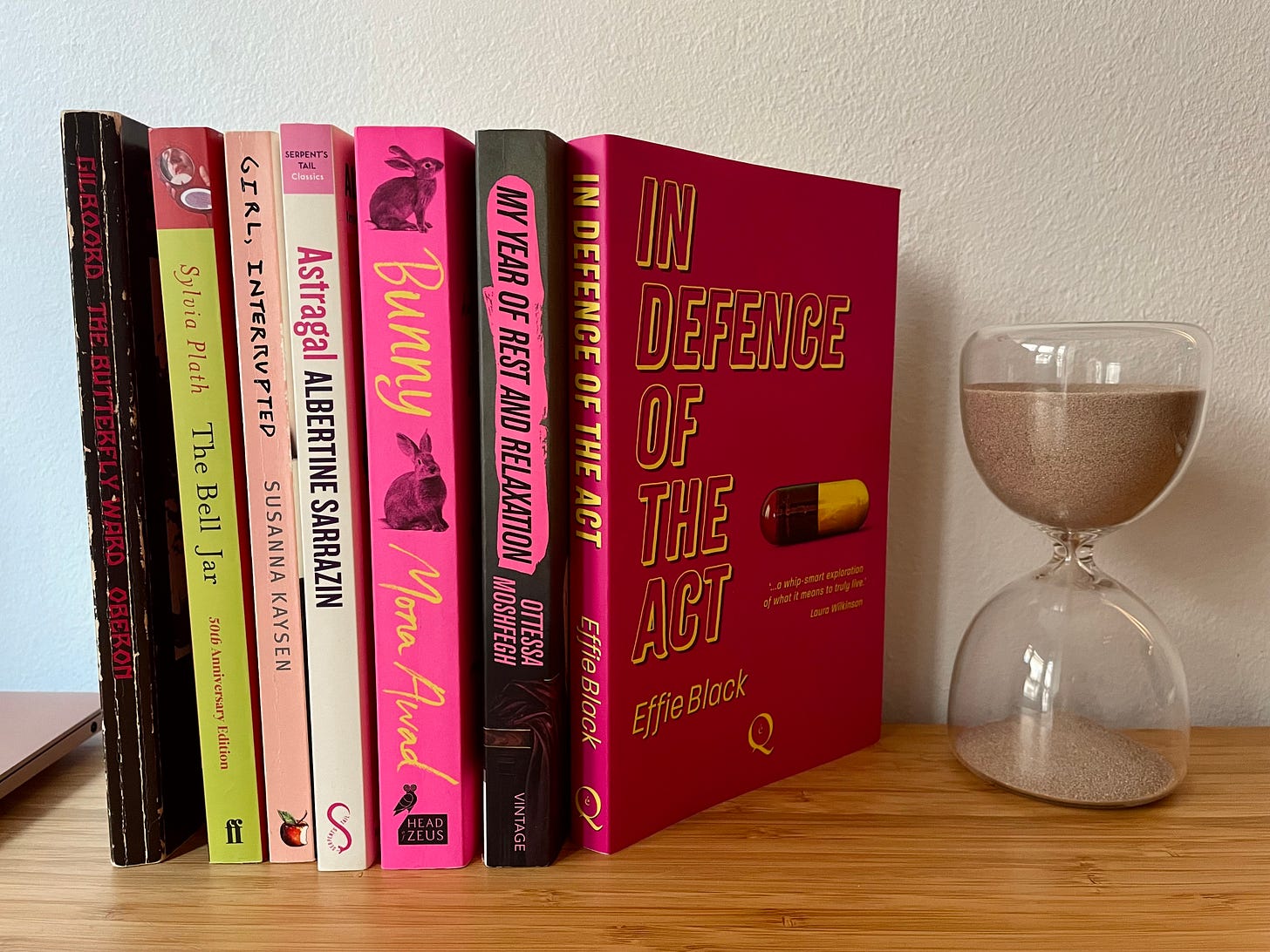let’s judge a book by its cover
In Defence of the Act by Effie Black — a hot mushrooms style book review
I finished In Defence of the Act, by Effie Black, about two weeks ago and I haven’t stopped thinking about it. Yet, even with this mental traffic I, woefully, cannot answer the question “what’s it about?” in a logical or concise manner. Please do not read this as anything but the highest praise. I love when stories force me to feel out their edges over time.
I seem to have an affinity with a kind of publishing genre I call Depression, For Girls💅🏻:
These books have more in common visually than they do thematically. Mental illness, or mental anguish, is an incredibly broad theme, but it seems like whenever a woman writes anything under the penumbra her book must be pink.
Given the reliability of my taste for Depression, For Girls💅🏻 literature I made some major assumptions about In Defence of the Act. In hindsight, rather silly assumptions.
To begin bluntly, the titular “act” is taking one’s life; I expected a suicidal main character. However, Jessica’s interest in the topic is informed by the suicidal thoughts and actions of the people in her life and is more academic. Literally, she studies animals that commit suicide, under specific circumstances, to ensure the continuance of their genetics.
Jessica is not lacking her own struggles; she has trauma to process from a childhood in an abusive, alcoholic house. But unlike, say, the main character of My Year of Rest and Relaxation, her life does not revolve around self-destruction.
It was confronting to realise that I had expected her, and maybe even wanted her, to be a real mess.
The book opens with Jessica attending a women’s resilience seminar — such a fun and economical way to introduce a character through their inner monologue during those excruciating events — where the presenter tells a story about boiling a carrot, an egg, and a coffee bean. The carrot goes soft and mushy. The egg is hardened. The bean stays intact while changing the water to coffee.
Jessica thinks she’s an egg, but over the course of the book she finds a secret, fourth thing that both changes the water and is changed itself.
And that’s what the book is about really. Finding that fourth thing. How she suffers setbacks, makes bad choices, learns from them, and is shaped by them. How she doesn’t consider suicide as a way to cope. Despite how often the act is attempted and completed by her family and friends.
Before closing, I have to mention two more technical bookish / writerly things that I also loved:
The non-linear storytelling. The chapters are not chronological and I think it show’s the author’s incredible grasp of her main character that it didn’t feel disjointed to learn about her out of order. Almost like when you’re getting to know a friend and their stories aren’t chronological either. (Except for the few chapters threaded through the book that seem to be in order. Not usually more than half-a-page. And to say any more would be a spoiler.)
The chapter titles. I am terrible at making titles for anything. For these posts, for my poetry, for my short stories, for email subjects. Writing a title seems to require a kind of sincerity or vulnerability that I am not comfortable with. I’m also not comfortable using “SEO friendly” titles, even though I know what they are, because ew.
Each chapter title in this book starts with the article “a”. Some of my favourites are A Wednesday, A Shoulder, A Hypothesis. It sets such a specific tone for the book as a whole, and is such an impressive feat of writing style and skill. Each one is a perfect summation of the proceeding bit of Jessica’s life, while also giving nothing away.
Here is how much I liked this book: I DMed Effie Black on Instagram to tell her I loved it. I never DM anyone. Ever. This might have been my very first.
I would recommend you, dear reader, read this book as soon as you can. It’s been published by a small press located in Brighton, UK and has been long listed for something called The Women’s Prize. The book itself is a lovely object, and I am not as bothered by the sans serif font as others are online. Get it before it wins The Women’s Prize and is picked up by a mainstream publisher and they change up the cover and font!1 You can buy it directly from époque press here (yay supporting independent publishers!) or find it on Amazon. I’m not linking that, just search for the title.
When it comes to this book I am definitely the carrot. It has changed me and made me mushy. I hope you’ll read it, and if not I hope you enjoyed this rather mushy book review.
thank you for reading this edition of hot mushrooms! if you liked it please share it, subscribe, all that jazz…
I don’t actually know if this is a thing that happens, but I have convinced myself it will happen to this book and I’m already mad about it.



